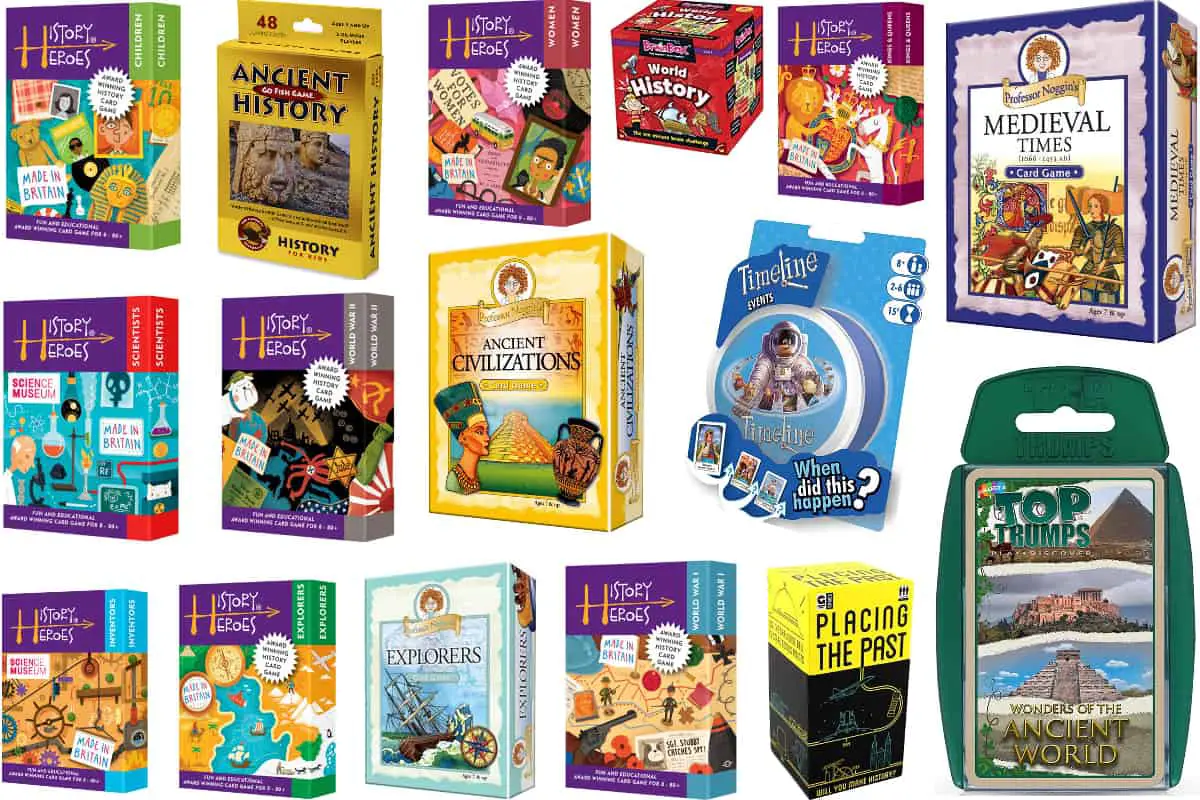This post contains affiliate links.
My mother is a retired history professor and would have loved to have relevant card games to propose to students to engage them more to learn history. From that point of view, world history is a good starting point, as an overall understanding of world history is so useful to anchor other pieces of indispensable knowledge. That is why I searched for card games that teach world history – and I found 18 relevant ones:
- Memory games like Brainbox: World History
- Event cards, for example, Placing the Past
- Thematic cards like Wonders of the Ancient World
- Quiz Cards such as History Heroes: World War 2
History Card Games Comparison Table
The card games in this list differ in historical themes. This comparison table will help you spot the most interesting ones for you. All games in this list can be used at home or at school.
| Game | Period | Type | Age | Players | Rating |
|---|---|---|---|---|---|
| Brainbox: World History | World History | Memory | 8+ | 1-4 | ★★★☆☆ |
| Placing the Past | World History | Events | 14+ | 3-4 | ★★★☆☆ |
| Timeline Events | World History | Events | 8+ | 2-8 | ★★★☆☆ |
| History Heroes: Children | World History | Quiz | 8+ | 2-6 | ★★★★☆ |
| History Heroes: Explorers | World History | Quiz | 8+ | 2-6 | ★★★☆☆ |
| History Heroes: Inventors | World History | Quiz | 8+ | 2-6 | ★★★★☆ |
| History Heroes: Kings and Queens | World History | Quiz | 8+ | 2-4 | ★★★☆☆ |
| History Heroes: Scientists | World History | Quiz | 8+ | 2-6 | ★★★★☆ |
| History Heroes: Women | World History | Quiz | 8+ | 2-6 | ★★★☆☆ |
| Ancient History Go Fish | Antiquity | Thematic | 8-15 | 2-4 | ★★★☆☆ |
| Classical Greece and Rome Go Fish | Antiquity | Thematic | 8-15 | 2-4 | ★★★☆☆ |
| Professor Noggin’s Ancient Civilizations | Antiquity | Quiz | 7+ | 2-8 | ★★★☆☆ |
| Wonders of the Ancient World | Antiquity | Thematic | 6+ | 2-6 | ★★★☆☆ |
| Professor Noggin’s Medieval Times | Medieval Times | Quiz | 7+ | 2-8 | ★★★★★ |
| Professor Noggin’s Explorers | Renaissance | Quiz | 7+ | 2-8 | ★★★☆☆ |
| Modern World History Go Fish | Modern Times | Thematic | 8-16 | 2-4 | ★★☆☆☆ |
| History Heroes: World War 1 | Modern Times | Quiz | 8+ | 2-6 | ★★★★☆ |
| History Heroes: World War 2 | Modern Times | Quiz | 8+ | 2-6 | ★★★★★ |
World History Card Games
This section has nine card games that tackle world history from the first century BC to the present day. There are memory games and quiz cards.
Brainbox: World History (The Greenboard Game Co.)
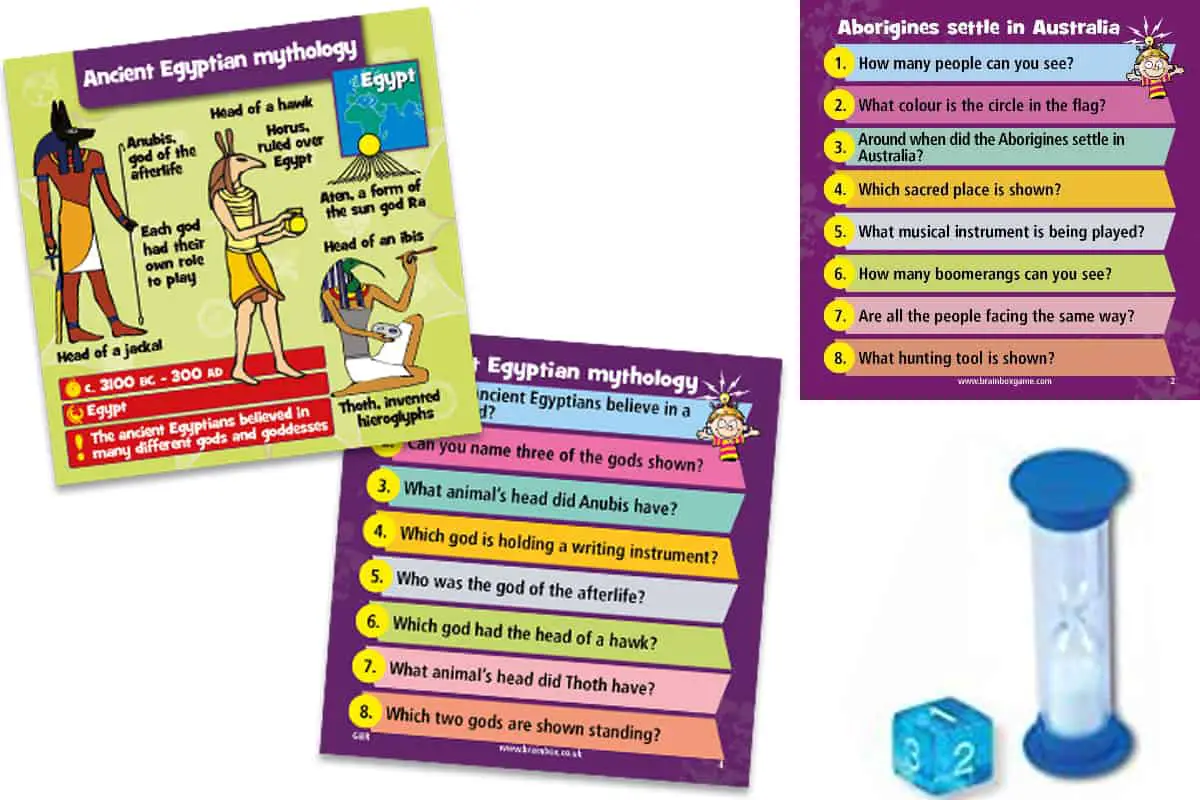
★★★☆☆
For Families and Teachers | Age 8+ | 1-4 Players| Playtime: 10 minutes | Designer: Gary Wyatt
Brainbox: World History is a memory game composed of 55 cards, a sand timer, a die, and a rules card.
is a memory game composed of 55 cards, a sand timer, a die, and a rules card.
The cards are double-sided.
- The front side has illustrations and information.
- The reverse side has eight questions.
- Players can find the answers are on the front side, so they must look carefully at each card.
This game can be played solo or with 2-4 players.
If played alone, the player has ten seconds to study the card. Then, on a piece of paper, the player must answer all the questions correctly. If successful, the player can keep the card and continue answering until ten minutes is up.
If played with more than two players, players have ten seconds to study the card. The next player reads the question aloud. The player will roll the dice to determine the question they would answer. The player who gave the correct answer can keep the card. If not, the card goes back to the pile.
The player who has the most cards after 5 or 10 minutes wins the game.
This game deserves three stars because:
- The artwork on the cards is attractive
- The answers are available
- Encourages players to retain information
Placing the Past (Ginger Fox)
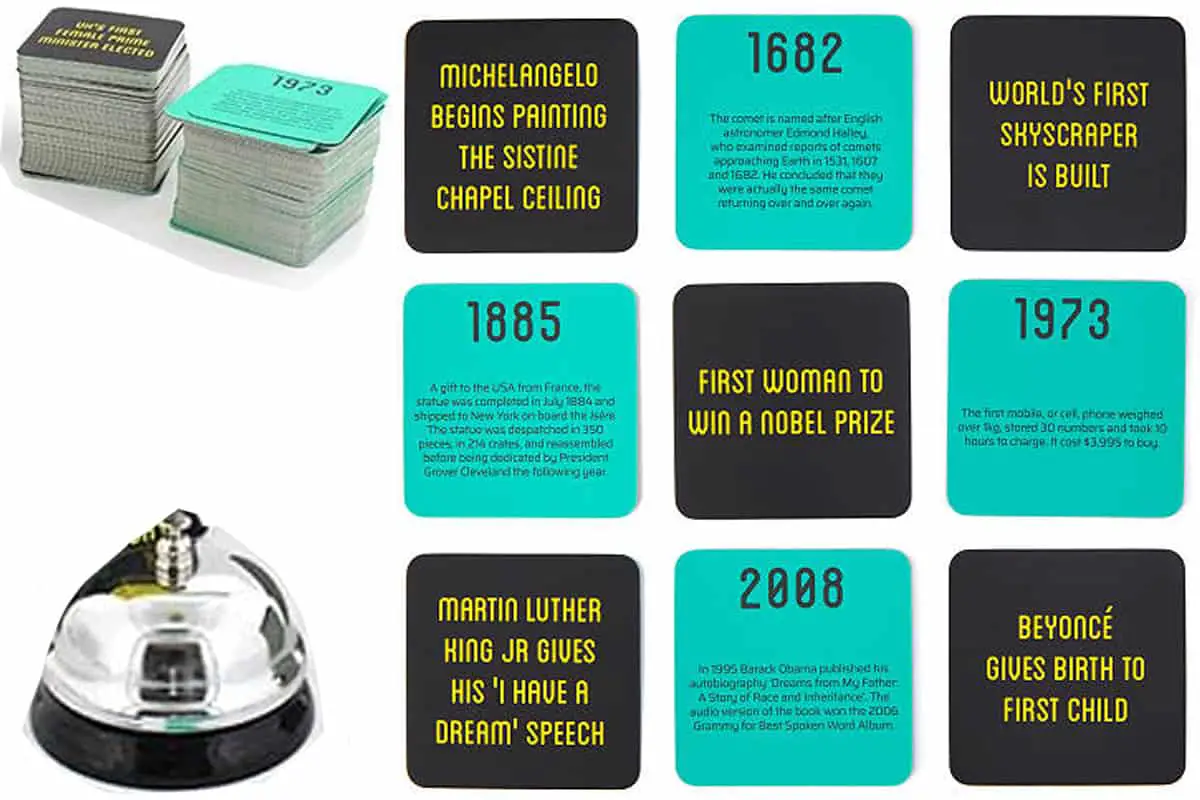
★★★☆☆
For Families and Teachers | Age 14+ | 3-4 Players |Play time: 20-30 minutes
In Placing the Past , players compete in creating the most extended but most accurate timeline of historical events based on the cards given to them.
, players compete in creating the most extended but most accurate timeline of historical events based on the cards given to them.
This game has 240 event cards, a challenge bell, and rules sheets.
The event cards start from 44BC until 2016. Half of the deck takes place in the 1900s and later centuries. There are about six cards that cover events from the first century until 1500.
Before playing the game, players must decide on how many rounds they are going to play. The game guide suggests basing the number of matches on player count.
For instance, if there are four players, then they will play for four rounds. The player who has the most points at the end of the fourth round wins the game.
At the start of the game, each player has five cards. They can arrange a minimum of 2 cards in the correct order. The extra cards are placed in the middle of the table face down to form the Card Pool. Other players can use the cards from the card pool to add to their timeline.
On the other hand, they can use all five cards if they are confident in their order.
If players believe that the timeline of their opponent is incorrect, they can use the challenge bell. Only one player can ring the bell per turn. Players get the chance to steal the cards.
If no one rings the bell and the timeline is correct, the player keeps all the cards.
The pros of this game include:
- The cards are easy to set up and do not take much space
- The texts are readable
- The game is fast-paced
- It could be enjoyed as a solo and multiplayer game
The cons of this game:
- The cards look dull because it’s pure text
- The events are not well-represented
- The challenge bell is not necessary (Players can simply declare during the game that they want to challenge another player’s timeline)
I recommend this game to learn the chronological order of historical events.
Timeline Events (Asmodee)
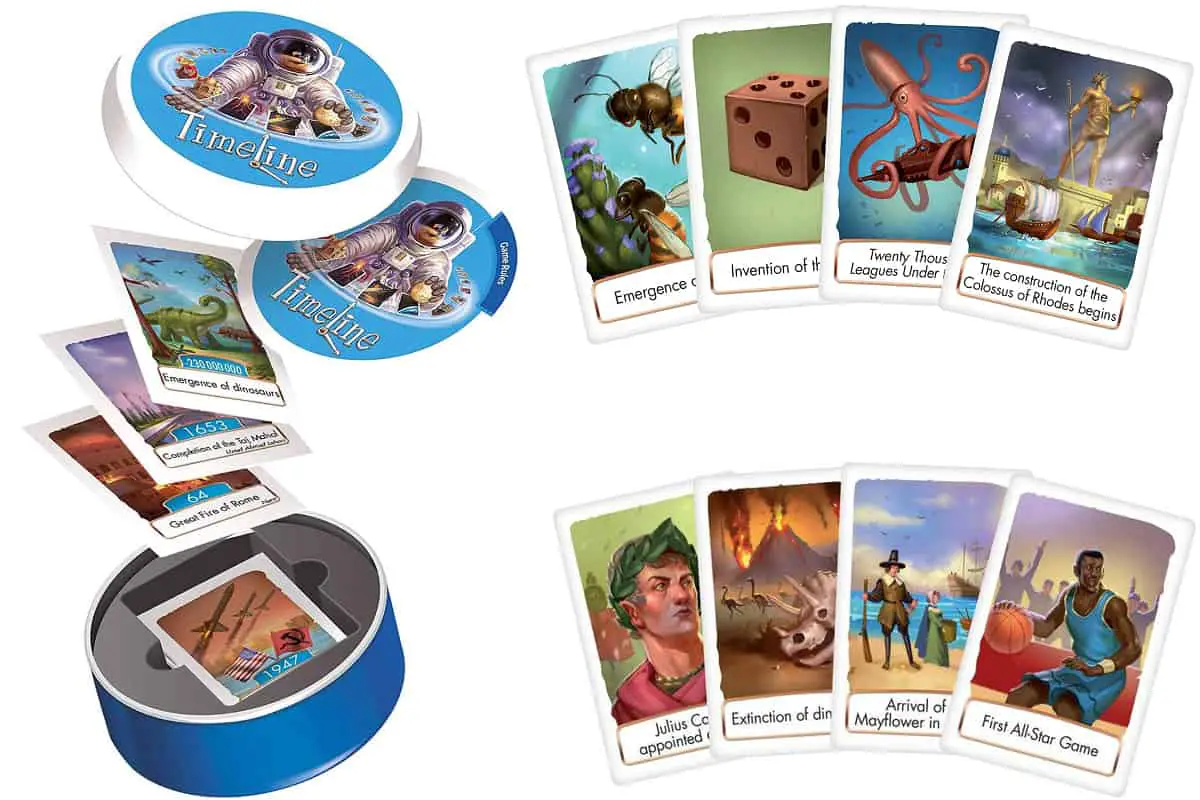
★★★☆☆
For Families and Teachers | Age 8+ | 2-8 Players | Play time: 15 minutes | designer: Frederic Henry
In Timeline Events, players take turns in placing an event card to form a timeline of historical events in the middle of the table. It is the most “serious” of the famous timeline series of games.
players take turns in placing an event card to form a timeline of historical events in the middle of the table. It is the most “serious” of the famous timeline series of games.
Timeline events consists of 55 double-sided cards:
- The front side of the card contains a picture and the name of the event.
- The reverse side indicates the date the event occurred. (This part should be hidden and should be revealed only during checking)
In this game, players draw a card on their turn. They decide whether to place it before or after the card played by the previous player. Players may discard a card if they feel that it is incorrect.
The object of the game is to dispose of all the cards on hand.
Depending on player count, the game starts with:
- six cards for 2-3 players
- five cards for 4-5 players
- four cards for 6-8 players
The plus:
- Nice illustrations
- Easy to learn and play
- Players can mix the cards with other editions to increase their replay value
The disadvantage I see is that the game becomes boring when players have memorized the dates (there are only 55 cards).
But of course, I really recommend playing Timeline which is now a classic!.. It does not require much prior knowledge, and can be used as a conversation starter to teach adjacent facts.
History Heroes: Children (History Heroes)
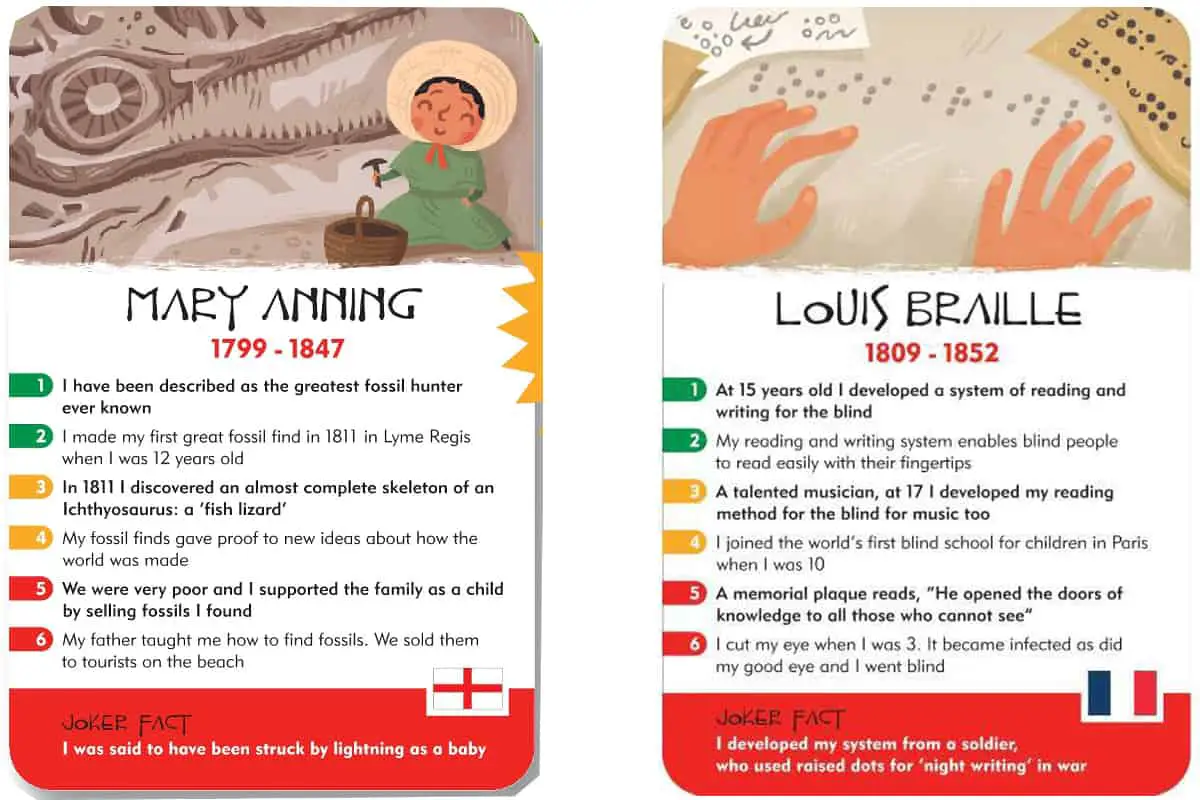
★★★★☆
For Families and Teachers | Age 8+ | 2-6 Players | Playtime: 10-20 minutes
History Heroes: Children contains 40 cards about individuals who inspired change around the world when they were still young. Some of the individuals included in this collection are:
contains 40 cards about individuals who inspired change around the world when they were still young. Some of the individuals included in this collection are:
- Joan of Arc
- Tutankhamun
- Mala Yousafzai
- Greta Thunberg
- Claudette Colvin
- Mozart
- Picasso
- Shirley Temple
- Stevie Wonder
In other words, players will learn about the extraordinary lives of remarkable children in history.
There are different ways to play this game. The usual gameplay is a guessing game using the picture or reading aloud bits of information about the history hero on the card.
Each card contains six facts. They are color-coded according to difficulty (six levels).
One correct guess is equivalent to one point. The player who obtained the highest score wins the game.
The plus:
- The facts are interesting and well-researched
- The presentation of information is friendly and not overwhelming for kids
- Teachers can use it as an icebreaker in the classroom because it only takes 10-20 minutes to play
I recommend playing History Heroes: Children because the theme inspires children to make significant contributions like the history heroes themselves.
History Heroes: Explorers (History Heroes)
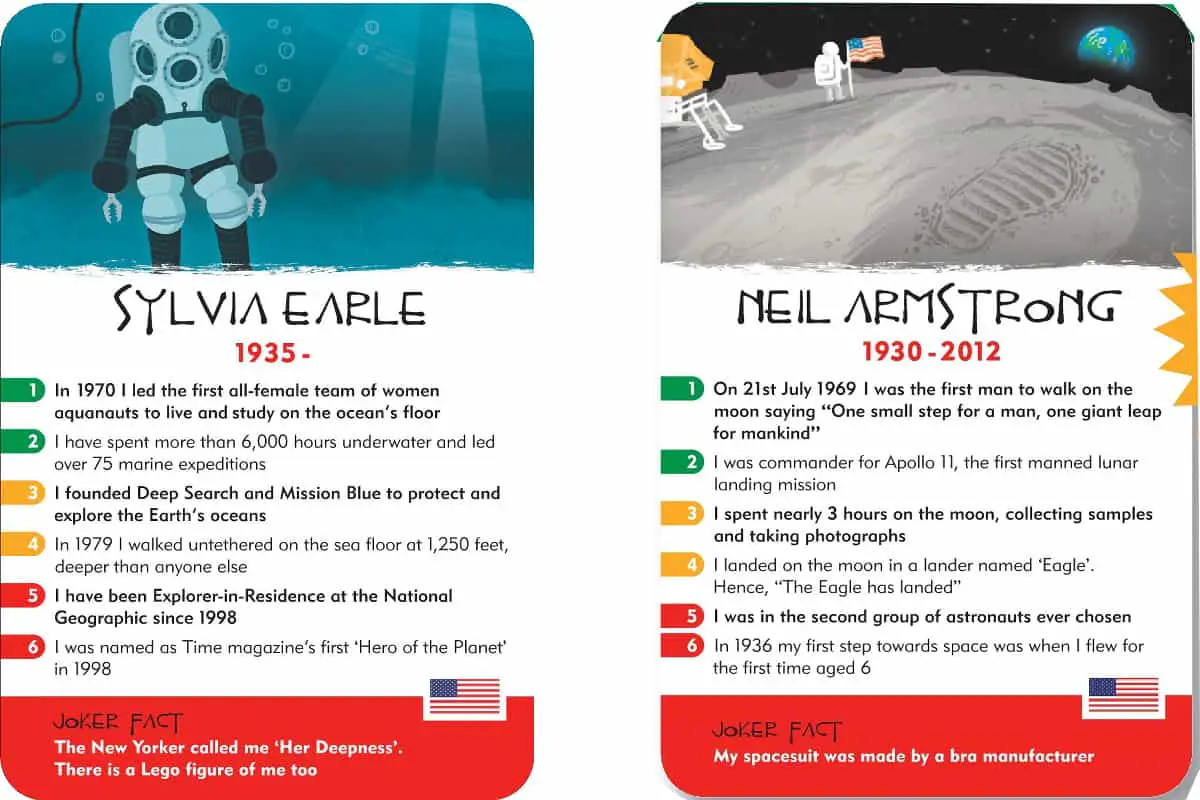
★★★☆☆
For Families and Teachers | Age 8+ | 2-6 Players | Playtime: 10-20 minutes
History Heroes: Explorers contains 40 quiz cards about the greatest explorers in history. The explorers date back to the first century or BC until the Present Day.
contains 40 quiz cards about the greatest explorers in history. The explorers date back to the first century or BC until the Present Day.
Just like the previous card game, the facts are color-coded and arranged according to three levels of difficulty.
It follows the same mechanics that include players taking turns in:
- drawing a card from the pile,
- reading a fact as a clue
- guessing the correct answer.
Children can check the correct answer on the card. The player who provides the correct answer keeps the card. The player who obtains the most cards is the winner.
The main difference with other history heroes’ editions is that character selection covers land, marine, submarine, and lunar exploration.
Aside from using these cards in a quiz game, I think children aged 8-10 years old can enjoy playing these cards in other ways like:
- Using a die (not included in the set) to determine the question to be answered (the facts are numbered 1-6)
- Arranging the cards in a timeline (they can use the birthyear or discovery date)
I like this set because:
- The cards are of excellent quality (with attractive pictures and readable fonts)
- The cards are educational and humorous at the same time (there’s a joker fact at the bottom of the card)
- The game is easy to play and fast-paced
- They can tweak the setup and the rules
For instance, instead of drawing one card at a time, they can start the game with five cards on hand and take turns in guessing by choosing a card in the player’s hand. The player who fails to identify the explorer gets an additional card, while the player who answers correctly discards one card. The player who got rid of all the cards wins the game)
The disadvantages of this game are:
- The explorers are not well-represented (small illustrations)
- The language used in the cards is challenging to understand (facts sometimes use scientific or technical terms that children are not familiar with)
Explorers are hardly known. Most facts may come off as difficult at first. But the explorers of the games are really inspiring figures, for example:
- Amelia Earhart
- Sylvia Earle
- Ibn Battuta
- Yuri Gagarin
- Leif Erikson
- Pedro Cabral
- James Cameron
- Ranulph Fiennes
- Neil Armstrong
- Roald Amundsen
- Sir Francis Drake
- Sir Walter Raleigh
- Ernest Shackleton
- Christopher Columbus
History Heroes: Inventors (History Heroes)
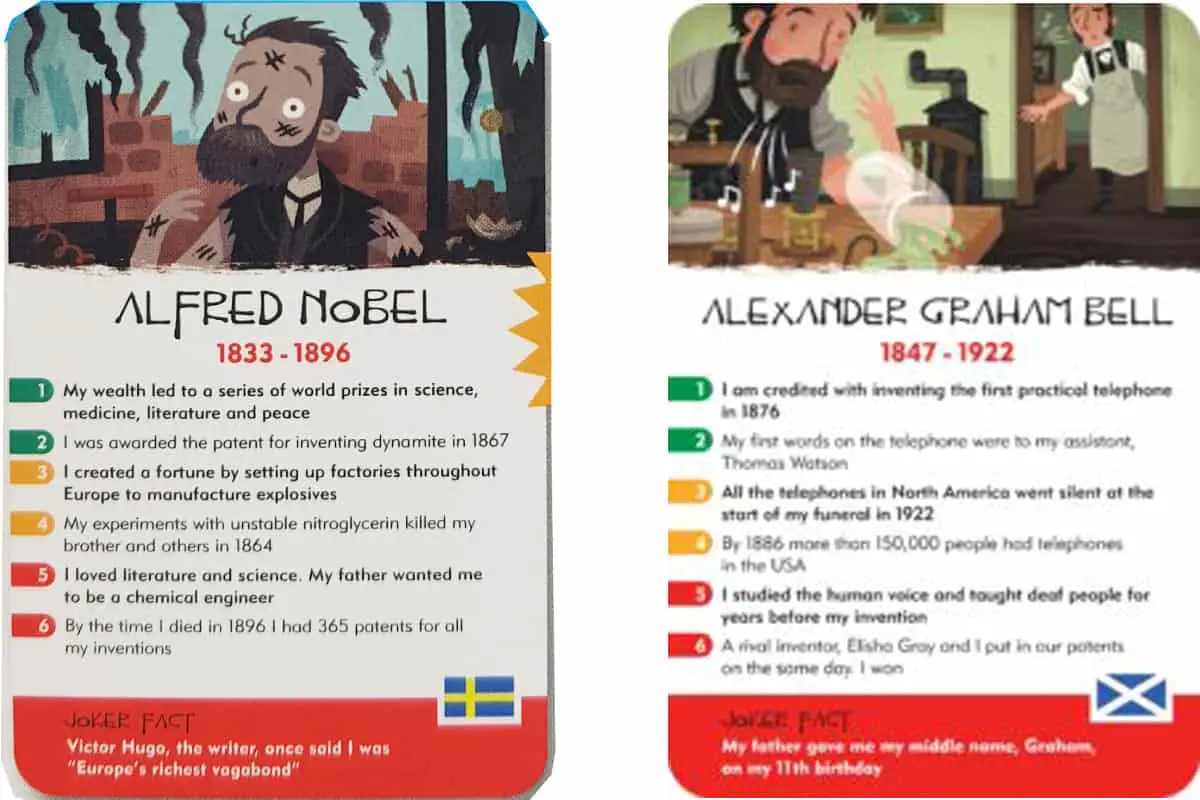
★★★★☆
For Families and Teachers | Age 8+ | 2-6 Players | Playtime: 10-20 minutes
Another challenging history card set is History Heroes: Inventors.
It has similar features and gameplay with History Heroes: Explorers. The 40 cards focus on the world famous inventors from 2000 years ago to the modern age, including:
- Ada Lovelace
- Tim Berners-Lee
- Alexander Graham Bell
- Henry Ford
- Hedy Lamarr
- Guglielmo Marconi
- Levi (Loeb) Strauss
- Oscar and Wilbur Wright
- Leonardo da Vinci
- Florence Nightingale
There are two ways to play these cards:
- Memory game (the illustrations are good; players must hide the inventor’s name)
- quiz game
- Players read facts as clues (the joker fact is a bonus, used for additional entertainment)
- contains two attributes for each level of gameplay: easy, average and difficult
If you would like to introduce more advanced gameplay than what is available, I suggest mixing clues. Use the two truths and one lie mechanics. (Tell two facts from the card and one false information from another inventor’s card)
This card set deserves four brownie points because:
- It has flexible rules (Players can decide how many cards and how many rounds to play)
- Players can manage difficulty by checking the level of gameplay (the facts are color-coded and numbered, players can start from the bottom in which is the hardest)
- Players can correct themselves (the answers are on the cards)
- The game can accommodate players with varying skills or knowledge about the history
- The game guide offers suggestions on how to increase the cards’ replayability. For instance,
- Making the game exciting by using scoring points where green =1, yellow-2, red =3 and the joker fact =5 points
- Having a master reader of facts so that players focus on guessing (it will be competitive though if they are allowed to answer in random)
History Heroes: Kings and Queens (History Heroes)
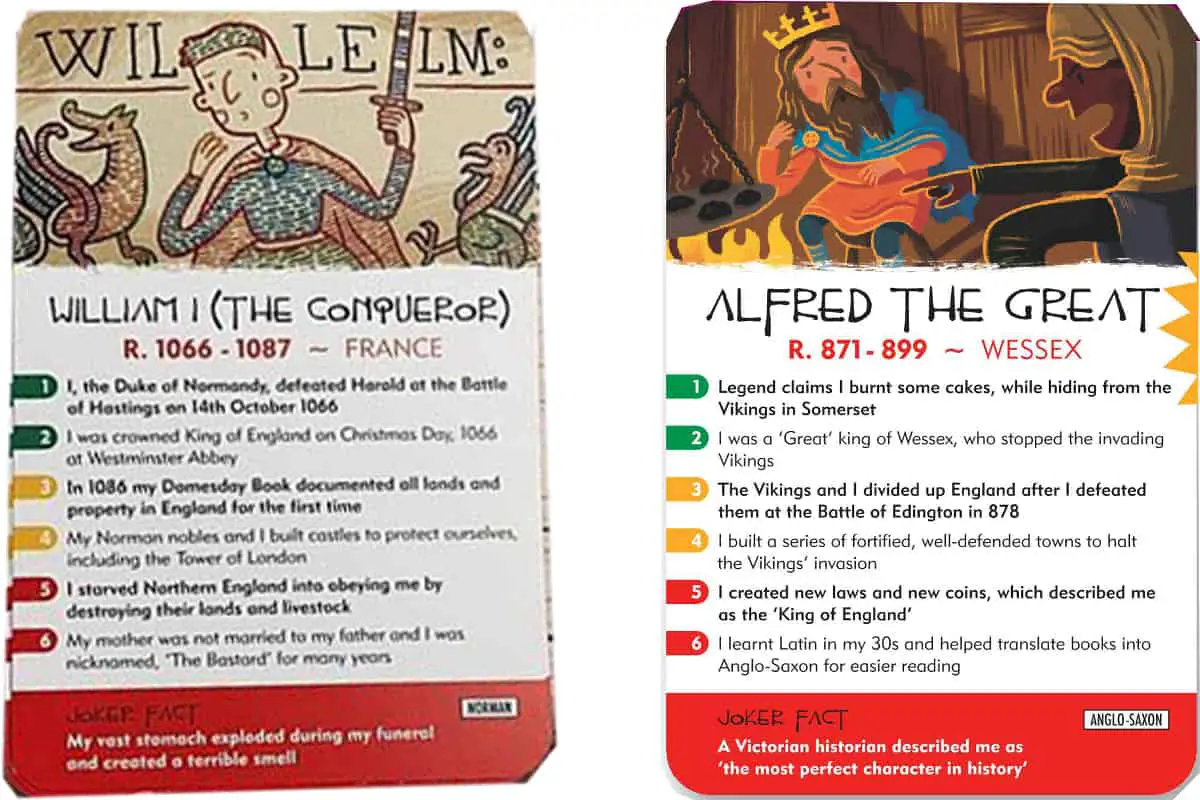
★★★☆☆
For Families and Teachers | Age 8+ | 2-4 Players | Playtime: 10-20 minutes
History Heroes: Kings and Queens work in a similar vein with previous History Heroes card games.
work in a similar vein with previous History Heroes card games.
This game’s main attraction is the collection of 40-character cards composed of British kings and queens from the 8th century BC to the present day. The cards feature:
- Alfred the Great
- Henry V
- Henry VII
- Richard I
- Richard III
- William I
- Oliver Cromwell
- George III
- Elizabeth II
- And more
The game’s goal is to win the most cards by guessing the monarch based on the facts or clues provided.
These cards are mainly enjoyed as a memory game and as a quiz. However, if players are familiar with the facts already, the following suggestions can serve as game variations:
- Playing charades (cards are drawn as topics for the guessing game)
- Doing “guess who” (providing facts answerable by yes or no)
- Secret characters (Players assume the role of the character cards they picked in the guessing game)
Some strong points:
- The cards are well-made (it includes a rhyming card that helps players remember the monarchs in order)
- Players can be creative in modifying the rules of the game
- The game has progression (players may start from easy to difficult questions as indicated by color and number, top to bottom of the card)
A negative point is that the game can be competitive (assigning scoring points to questions).
You will be discovering unknown facts about the rulers in British history.
History Heroes: Scientists (History Heroes)
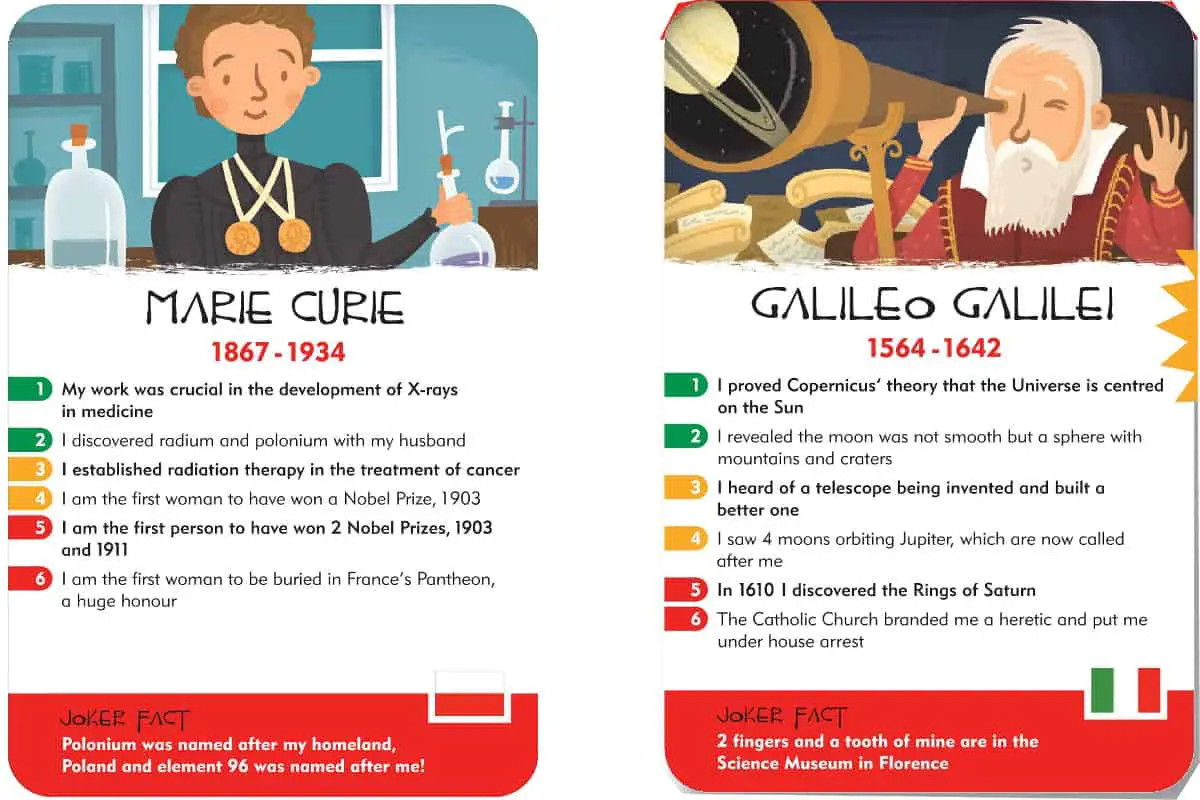
★★★★☆
For Families and Teachers | Age 5-10 | 2-4 Players | Playtime: 10-20 minutes
History Heroes: Scientists consists of 40 cards that list the contributions and discoveries of the world’s most influential scientists from the first century BCE to the 21st century.
consists of 40 cards that list the contributions and discoveries of the world’s most influential scientists from the first century BCE to the 21st century.
The collection includes:
- Archimedes
- Aristotle
- Copernicus
- Galileo Galilei
- Sir Isaac Newton
- Sir Humphry Davy
- Robert Boyle
- Robert Bunsen
- Thomas Henry Huxley
- Edward Jenner
- Alexander Fleming
- Charles Darwin
- Marie Curie
- Wilhelm Conrad Rontgen
- Michael Faraday
- John Dalton
- Albert Einstein
- Ernest Rutherford
- Irene Joliot-Curie
- Dorothy Hodgkin
- Rosalind Franklin
- Elizabeth Blackburn
- Richard Feynman
- Jocelyn Bell Burner
- Stephen Hawking
The game mechanics are similar to other History Heroes card games.
The nice points:
- The game offers various gameplay alternatives aside from Quiz game & Memory game
- The cards contain fascinating information
- Teachers can utilize the cards as visual aids or components for classroom activity
- It can be played independently or with 2-4 players
Sometimes the language used in the facts is challenging for young players (most terms need explanation, for example, microbiologist, physicist, laws of electrolysis, theory of relativity, and more). On the bright side, such unfamiliar words can open discussions. Adult supervision is helpful.
A great point is that the facts include the most critical achievements of each scientist.
History Heroes: Women (History Heroes)
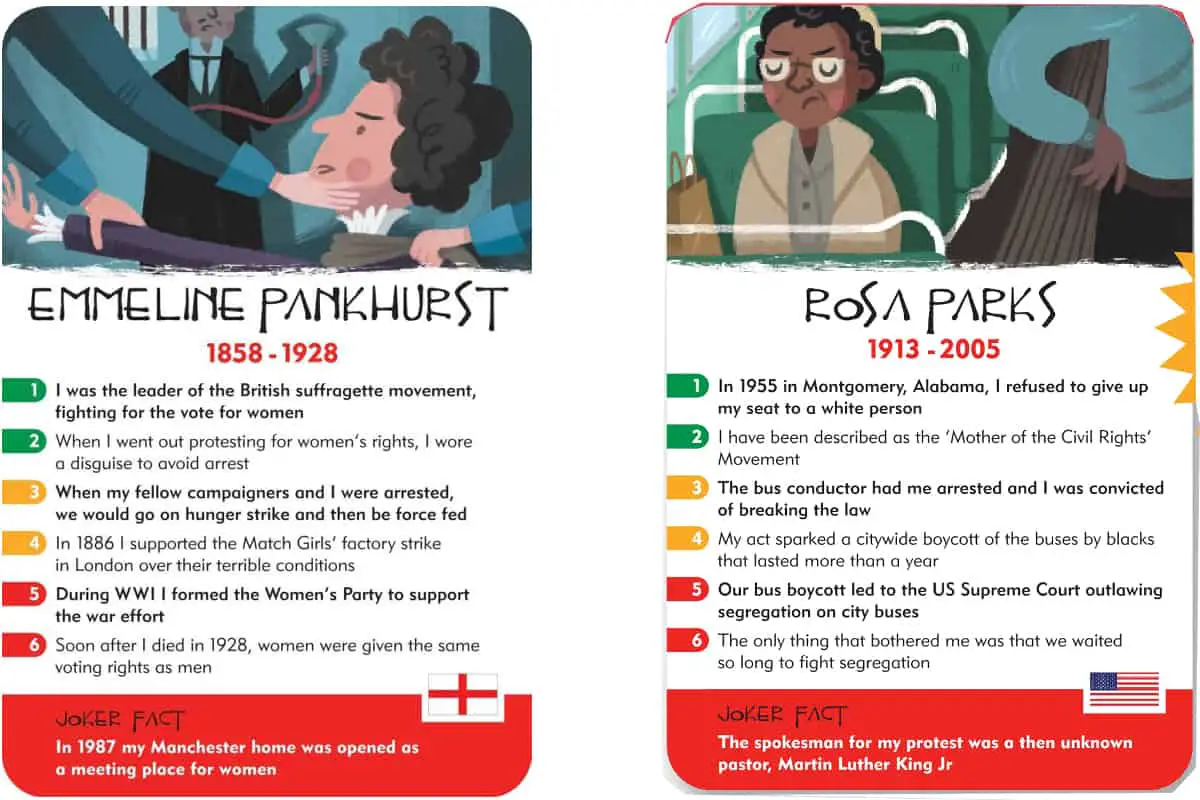
★★★☆☆
For Families and Teachers | Age 8+ | 2-6 Players | Playtime: 10-20 minutes
History Heroes: Women features 40 influential women from the first century BC to the 21st century.
features 40 influential women from the first century BC to the 21st century.
The list includes:
- Cleopatra
- Joan of Arc
- Catherine the Great
- Jane Austen
- Ada Lovelace
- Anne Frank
- Mary Seacole
- Rosalind Franklin
- Aretha Franklin
- Florence Nightingale
- Margaret Thatcher
- Emmeline Pankhurst
- Maya Angelou
- Mother Teresa
- Rosa Parks
- Mary Anning
- Mary Wollstonecraft
- Frida Kahlo
- Angela Merkel
- Elizabeth II
I like this card set because:
- Iit has a good mix of influential and talented women in different fields such as politics, arts, science, technology.
- It includes interesting anecdotes about their lives
- The facts celebrate women’s significant contributions that are inspiring for children
- The pieces of information are useful
- Game variations are available like other History Heroes card games
But:
- Some women on the list are less famous. Hence, the clues may not be familiar to players
- Some facts use unknown terms
Ancient History Card Games
In this section, I listed four ancient history card games that are helpful especially for children in the eighth grade (13-14 years old), but can be played before.
Ancient History Go Fish (The Classical Historian)
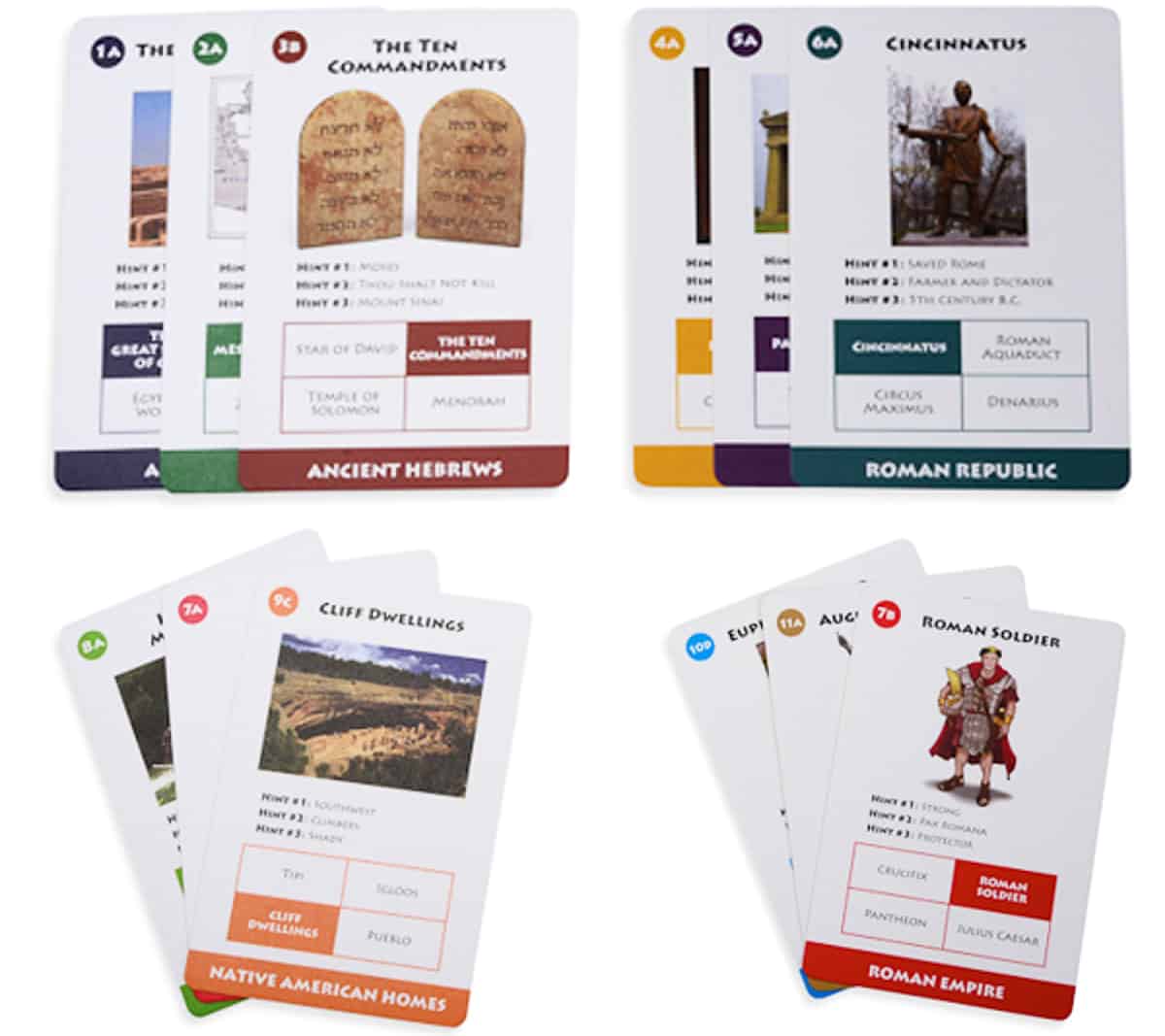
★★★☆☆
For Families and Teachers | Age 8-15 | 2-4 Players | Playtime: 20-30 minutes
Ancient History Go Fish features historical facts about the cradles of civilization.
features historical facts about the cradles of civilization.
It consists of 48 cards and a booklet.
Each card displays:
- A picture
- Name (person, landmark, etc.)
- three hints (related topics, person, or event)
- Symbols (upper left corner of the card, used for arranging the cards in chronological order)
- Category words (placed in 4 boxes, the card on hand has a shaded box. The unshaded boxes are the ones to look for)
The main category is at the bottom of the card.
There are 12 categories, each with four cards:
- Prehistory
- Ancient Asia
- Mesopotamia
- Ancient Hebrews
- Ancient Egypt
- Ancient Greece
- Roman Republic
- Roman Empire
- Native American Homes
- Political Leaders
- Seven Continents
- Rivers of Early Civilizations
There are two ways to play:
- Go Fish
- Players collect four cards that belong to the same category. The player with the most sets is the winner.
- For students aged 8-15 years old
- Collect the Cards
- Players take turns in reading the hints on the card while the remaining players guess the card. If a player guesses correctly, he can keep the card. If no one correctly answers after three hints, the reader collects the card. The player with the highest number of cards at the end of the game is the winner.
- For students aged 12 years old and above
The positive features include:
- The booklet contains instructions and suggestions on how to use cards for solo play and classroom activity
- The packaging is convenient and portable (compact and easy to store)
- The cards use actual images
- It provides an opportunity to build historical knowledge (for instance, children with zero historical background can enjoy Go Fish and learn event names, historical figures, and dates little by little)
On the other hand, if you are expecting heavy information from these cards, you might be disappointed because this card set does not give full details of historical events. Students learn historical facts by association.
I am giving this game three stars because hints are limited to a few words which are not familiar to new players or players without a background in the history.
This game can help students aged 8 to 15 identify and associate particular names and events to specific civilizations in ancient history.
Classical Greece and Rome Go Fish (The Classical Historian)
★★★☆☆
For Families and Teachers | Age 8-15 | 2-4 Players | Playtime: 20-30 minutes
Like the previous Classical Historian card game, Classical Greece and Rome Go Fish contains 48 cards and a booklet.
contains 48 cards and a booklet.
This card set has 12 categories with four cards each.
- Greek Thought
- Greek Leaders
- Greek Life
- Greek Mythology
- Greek War
- Greek Government
- Roman Leaders
- Roman Architecture
- Roman Mythology
- Roman Military
- Roman Government and Law
- Christianity
Each card contains:
- Image of the historical item
- Historical label (person, event, landmark)
- The symbol used for arranging the cards in a timeline (found at the upper left corner of the card)
- three hints
- Related words
- Category label (placed at the bottom of the card)
This card game is helpful to children aged 8 –15 years old because:
- The categories are well-divided
- They learn specific information about ancient Greece and Rome
- It offers gameplay appropriate to the learner’s skills and knowledge in ancient history (Beginners can enjoy Go Fish while advanced players will opt for Collect the Cards)
Professor Noggin’s Ancient Civilizations (Outset Media)
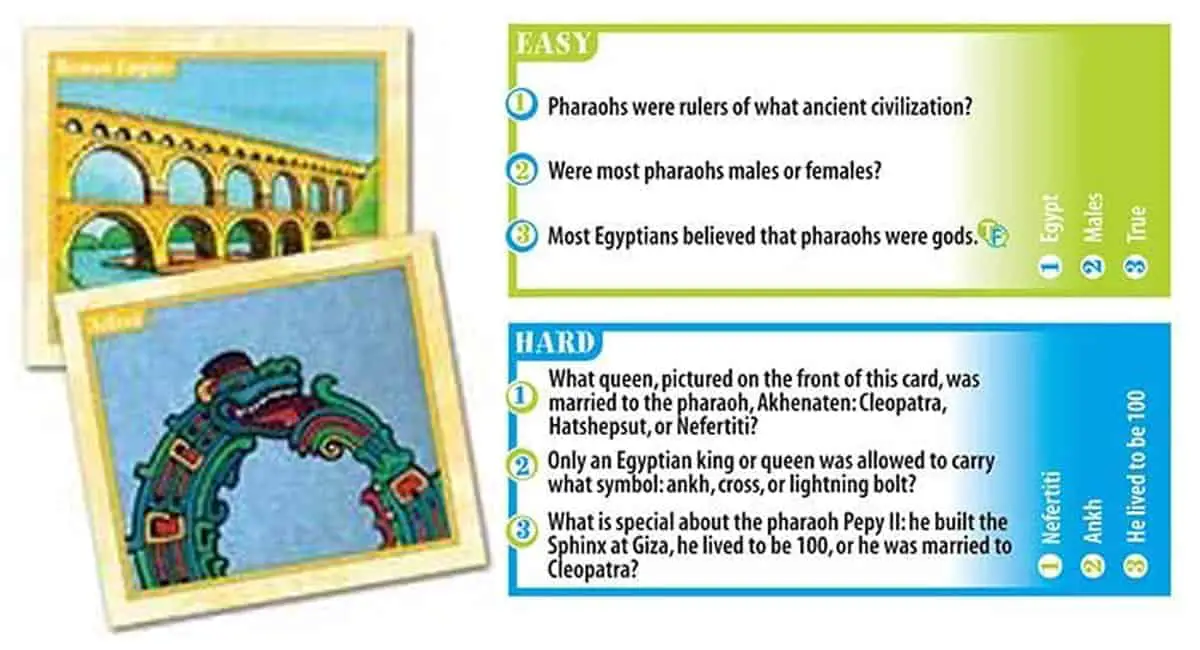
★★★☆☆
For Teachers | Age 7+ | 2-8 Players | Play time: 30 minutes
Professor Noggin’s Ancient Civilizations is a quiz game that enables children aged 7 years old and above to learn the facts about ancient civilizations such as China, Egypt, Greece, Mesopotamia, Mayans, Incas, Romans, or Vikings.
is a quiz game that enables children aged 7 years old and above to learn the facts about ancient civilizations such as China, Egypt, Greece, Mesopotamia, Mayans, Incas, Romans, or Vikings.
This game is composed of 30 cards, a 3-numbered die, and an instructions guide.
Each card contains three questions which focus on:
- Arts and crafts
- Clothing
- Farming
- Religion
- Philosophers and Artists
- Warfare
- And many more
There are two levels of gameplay:
- Easy– contains two trivia questions and a true-false question (great for beginners)
- Hard– has three multiple-choice questions (suitable for adults or advanced players)
Here’s how to play the game:
- Players select the level of gameplay for each player.
- Players take turns in rolling the three-numbered die to determine the question to be asked.
- Players draw a card from the pile and pass it to the next player. That player will read the question.
- If the answer is correct, the player keeps the card. If not, the player returns the card to the pile.
The player with the most cards at the end of the game shall be declared the winner.
The good points of this game are:
- Players can find the answers at the bottom side of the card
- Beginners can play with advanced players (just remember the level they are playing)
- The cards are colorful and packed with information
- This game has unique cards that make it challenging and exciting
- Noggin Buster contains difficult questions
- Noggin’s Choice gives the player the unique power to not answer the questions and choose a card from another player’s deck to add to their pile.
The weak points of this game are:
- The replayability decreases because the cards are limited (removing the choices and rewording some questions can help modify the game mechanics if players are too familiar with the content already)
- Children vary in interest in ancient civilizations, especially if they lack reading skills. (I suggest building up their confidence first by using half of the deck and pairing young players with older or adult players
Wonders of the Ancient World (Top Trumps)
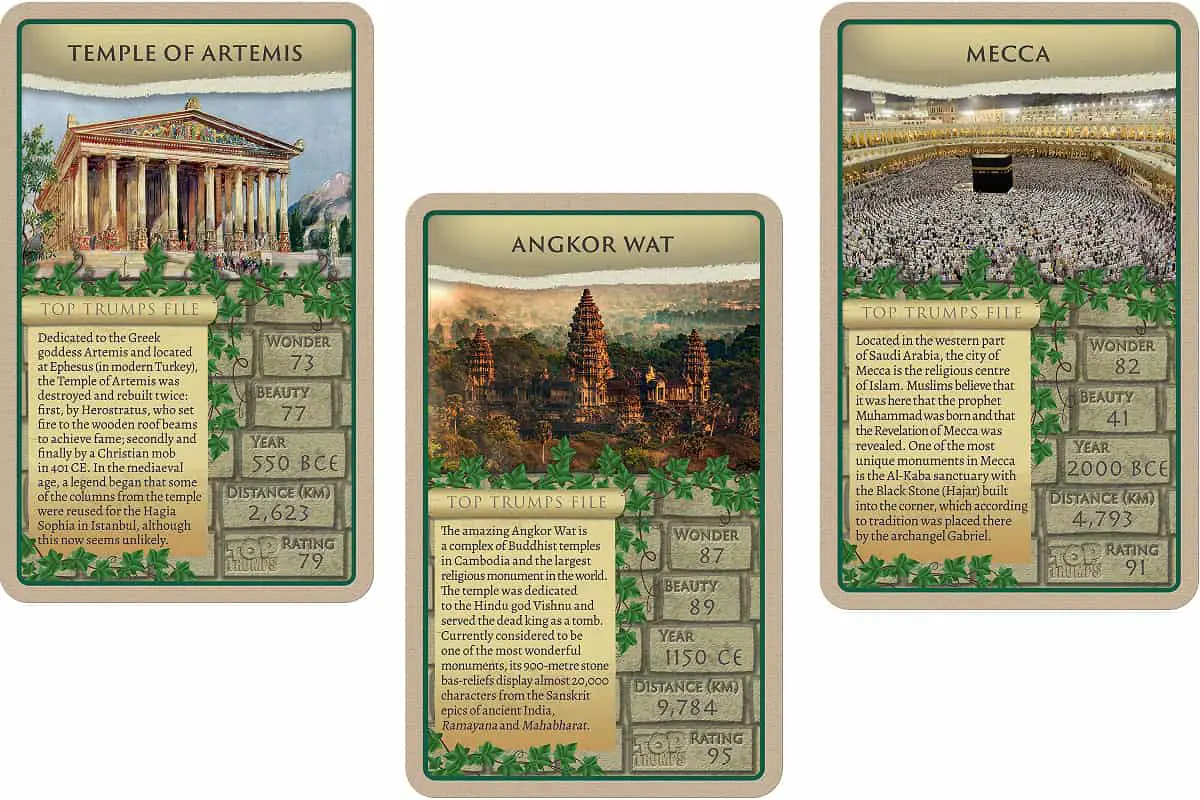
★★★☆☆
For Families | Age 8+ | 2-6 Players | Play time: 10-20 minutes
In Wonders of the Ancient World , players use the following categories in outsmarting each other in Top Trumps’ fashion:
, players use the following categories in outsmarting each other in Top Trumps’ fashion:
- Wonder
- Beauty
- Year
- Distance from London
- Rating
This game is composed of 30 cards that feature the wonders of ancient times like:
- Angkor Wat
- Chichen Itza
- Citadel of Cairo
- The Great Wall of China
- The Great Pyramid of Giza
- Mecca
- Temple of Artemis
- The Pantheon
Children aged 8 years old and above will learn historical information placed on the Top Trumps File.
In case you haven’t played Top Trumps,
- Players choose a category hoping that its numerical value is the highest among the players’ cards.
- The winner of that round collects the cards of other players. Then, puts them at the bottom of their cards.
- The winning player calls another category until all the cards are played and won.
- The player with all the cards at the end of the game is the winner.
I like this game because:
- The gameplay is familiar, easy to play, and fast-paced
- The cards are attractive (the images are clear and beautiful)
- The game does not require prior knowledge of history, but they learn little by little the wonders (if the player can read, the Top Trumps file section provides additional information)
The weak point is the fabricated data (wonder/beauty) which are very subjective, and the British centric “Distance” which is in fact the distance from London and is not relevant in the USA.
Medieval Times Card Game
Professor Noggin’s Medieval Times Card (Outset Media)
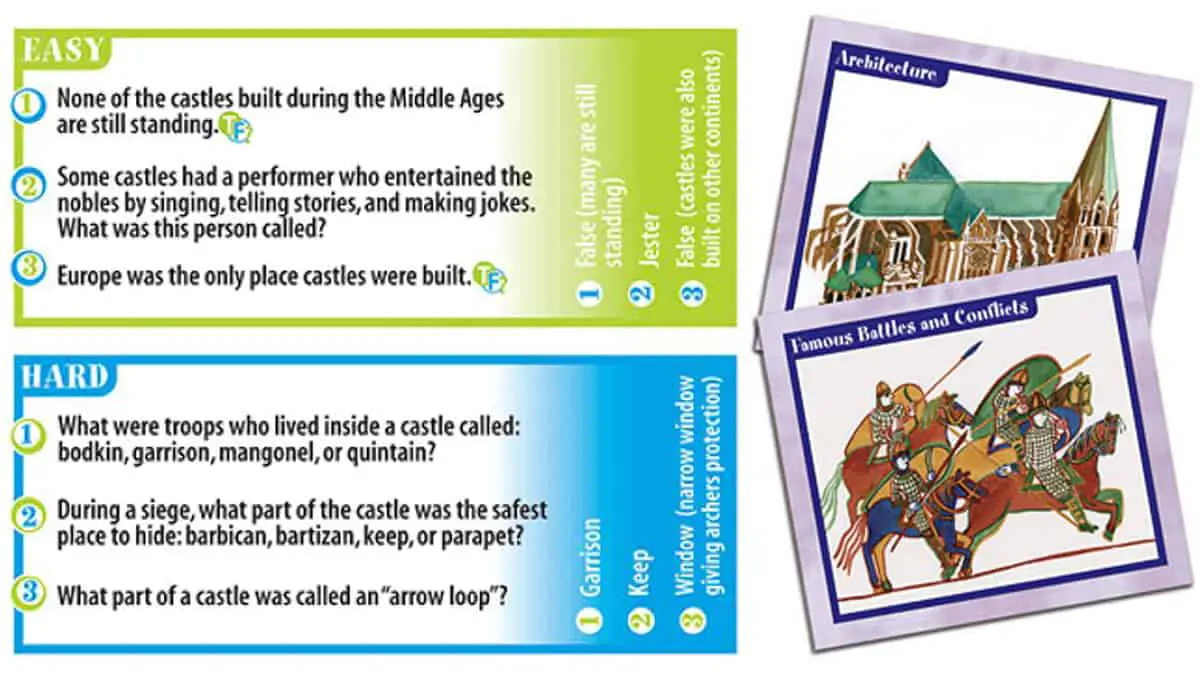
★★★★★
For Parents | Age 5-14 | 2-8 Players | Play time: 30 minutes
In Professor Noggin’s Medieval Times Card, players learn facts about medieval history (1066-1453 AD) by answering different types of questions.
players learn facts about medieval history (1066-1453 AD) by answering different types of questions.
This game has 30 cards with six questions each. There are two difficulty levels: easy (for 5-7 year-olds) and Hard (8-10 year-olds).
After selecting the level, players choose a question by rolling the three-numbered die.
The next player reads the question. If the player gives the correct answer, the player collects the card. If not, the card goes back to the pile.
The player with the most cards wins the game.
This game covers 30 topics which include:
- Black Death
- Crusades
- Famous Battles and Conflicts
- Feudalism
- Islam and Muslims
- Jews in the Middle Ages
- Medieval Empires
- Technologies and Inventions
- And more
The biggest challenge is the overwhelming number of unfamiliar words and events. These could lose the interest of players. Giving children ample time to study the cards may encourage them to aim for the most challenging questions. I recommend especially to play with middle school children because of that.
I find the illustrations attractive. They will spark interest in knights, kings, queens, village life, castles, cities, and guild in the medieval period.
Renaissance Card Game
Professor Noggin’s Explorers (Outset Media)
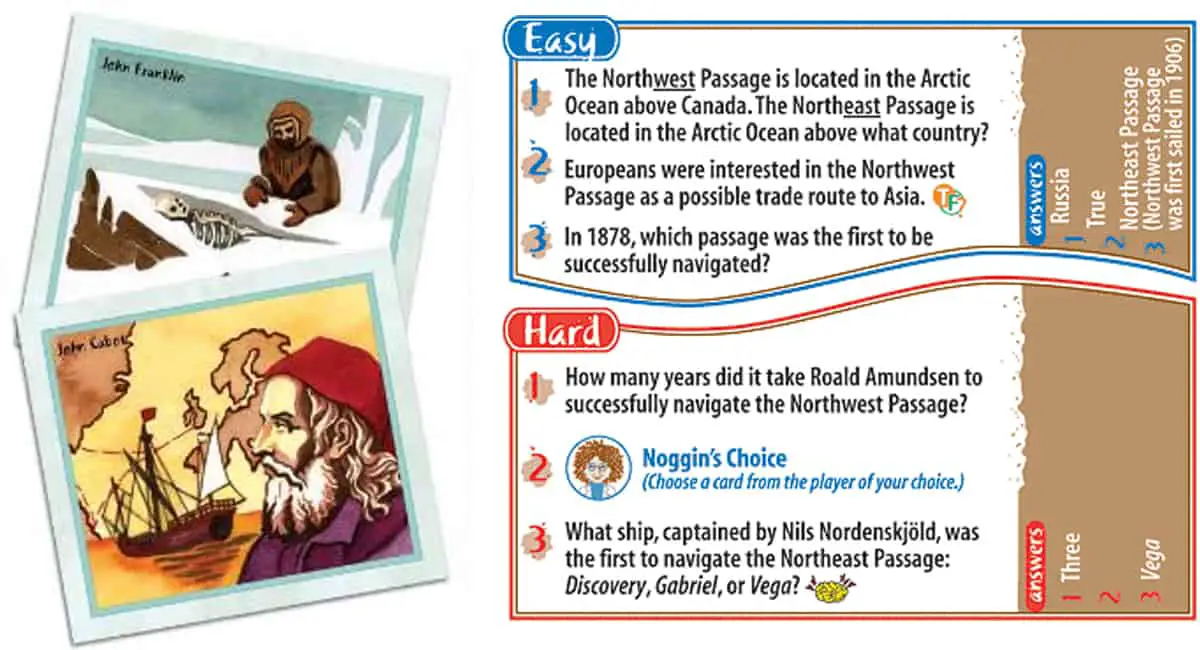
★★★☆☆
For Families and Teachers | Age 7+| 2-4 Players | Playtime: 30 minutes
Professor Noggin’s Explorers consists of 30 quiz cards about the explorers that flourished in the Age of Exploration.
consists of 30 quiz cards about the explorers that flourished in the Age of Exploration.
This game follows the similar mechanics of Professor Noggin’s Medieval Times Card. It also uses a 3-numbered die and two difficulty levels.
Similarly, the questions are composed of:
- two trivia questions and one true or false item for Easy level
- three multiple-choice questions for Hard level
The cards contain illustrations that pertain to the 30 topics it covers, such as:
- Magellan’s Expedition
- Polynesian Explorers
- River Explorers
- Space Exploration
- Underwater Exploration
- Encounters with Native Peoples
- And more
The good things about this game are:
- Good illustrations
- The cards are self-correcting
- Two levels of difficulty
Children aged 7 years old and above will learn facts about:
- John Cabot
- Christopher Columbus
- James Cook
- Charles Darwin
- Francis Drake
- John Franklin
- Henry Hudson
- Lewis and Clark
- Marco Polo
- Hernando Soto
- Vikings
Overall, children may not find this theme interesting because the explorers may be unheard of when they try the game. I propose to start with the easy level with a few cards and tweaks to the rules (skipping the dice roll, and instead taking turns answering questions without penalties).
Also, there are unfamiliar terms in the questions. Therefore, using a dictionary is helpful.
I recommend playing this game with children aged 7 years old and above, 11th graders in particular. They can use this card set as a supplement to lessons in science, geography, and history.
3 Modern World History Card Games
In this section, I gathered three history card games that are helpful for students from grades 8 to 11.
Modern World History Go Fish (The Classical Historian)
★★☆☆☆
For Families and Teachers | Age 8-16 | 2-4 Players
Modern World History Go Fish is another card game produced by The Classical Historian.
is another card game produced by The Classical Historian.
It consists of 48 cards that belong to 12 categories with four cards each. These categories are:
- The Age of Revolution
- Industrial Revolution
- Peace, Free Trade and Liberalism
- British Colonialism
- The Radical Left
- Nationalism and Unification
- World War I
- Totalitarianism
- World War II
- Rise and Fall of Communism
- The Developing World
- Globalism
The cards use actual images for historical items.
I find though that the rules are too basic for the targeted age groups (Go Fish for 8-10 years olds and Collect the Cards for 11-16 years olds). Also:
- Hints are composed of a few words which may or may not make sense, especially if players do not have a deep understanding of the history
- The game aims to recognize event names, dates, people, landmarks, and more but not the details of the historical events.
History Heroes: World War 1 (History Heroes)
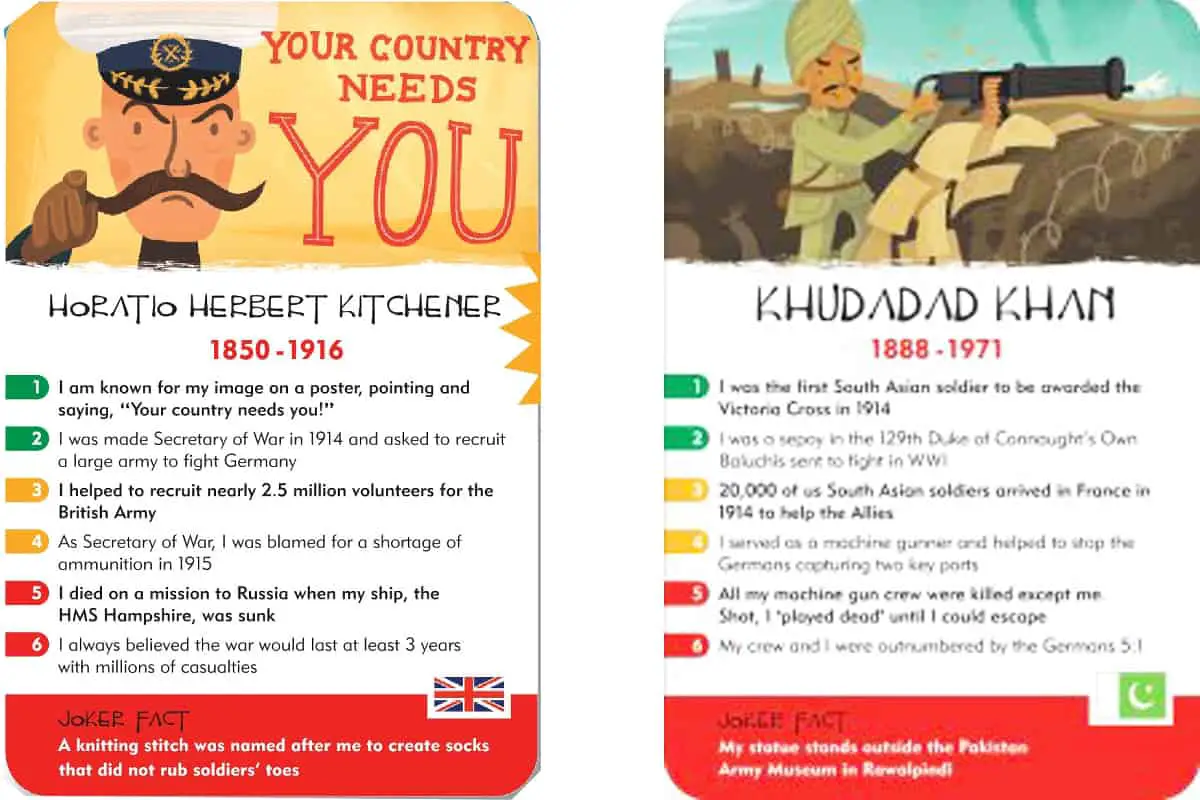
★★★★☆
For Families and Teachers | Age 8+ | 2-6 Players | Playtime: 10-20 minutes
In History Heroes: World War 1, players compete in guessing the World War 1 hero on the card after listening to the clues.
players compete in guessing the World War 1 hero on the card after listening to the clues.
This quiz card game is composed of 40 cards.
To name a few:
- “Blackjack” Pershing
- Marshal Joffre
- Field-Marshal Haig
- King George
- Kaiser Wilhelm II
- Tsar Nicholas II
- Lloyd George
- Woodrow Wilson
- Edith Cavell
- Winston Churchill
- Flora Sanders
- Siegfried Sasson
- Walter Tull
Each card contains a joker fact and six color-coded facts. There are two questions for each level:
- Easy (green)
- Moderate (yellow)
- Difficult (red)
I like that:
- The cards are well-designed and appealing
- Players can devise rules on how to play the game. Or they can follow the suggestions in the instructions guide.
- For instance, players can roll a die to determine the clue to be given by the reader since the facts are numbered 1-6.
This card set is helpful for students in grade levels 10-11 because:
- They will learn the roles of political leaders, military soldiers, women, and even animals during the first world war
- The facts contain the heroes’ connections with other interesting people
- The content is a combination of positive and negative events
All in all, I recommend this game to be played with children aged 8 years old and above because
- It opens the discussion of World War I in an engaging way
- The gameplay makes this complex subject easy: light but substantial.
History Heroes: World War 2 (History Heroes)
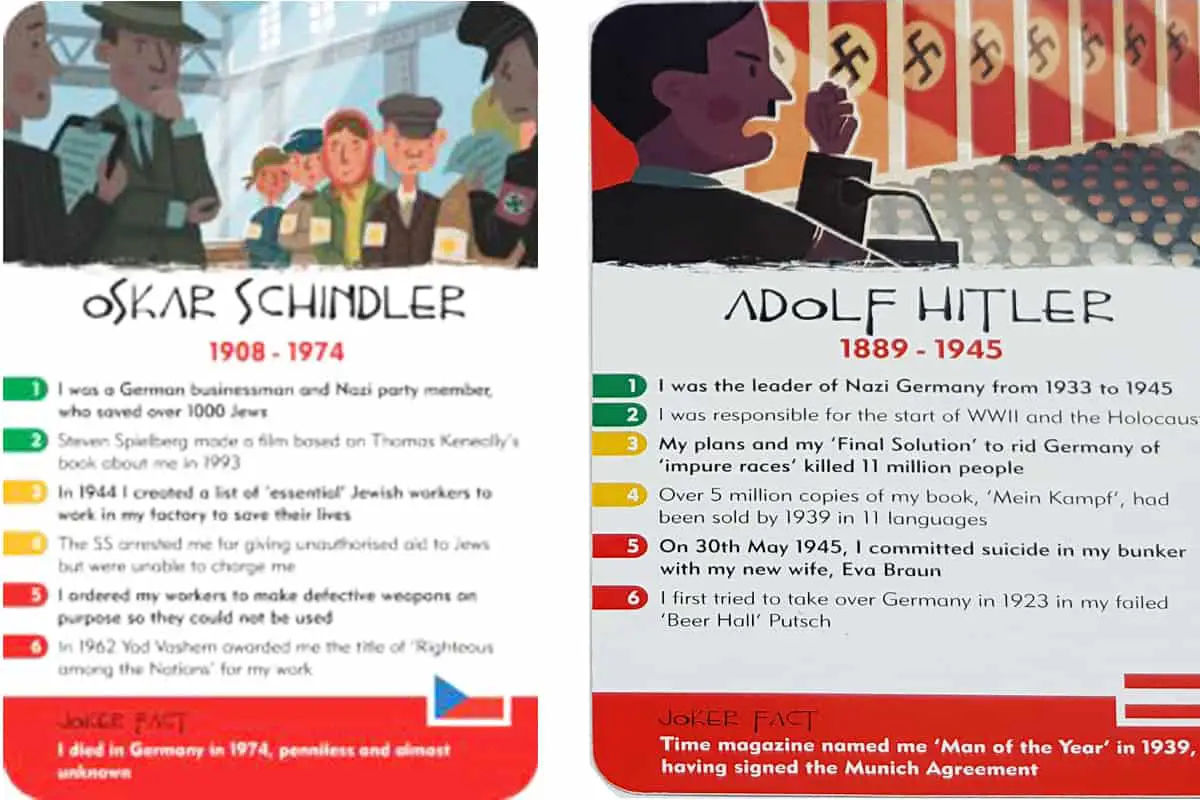
★★★★★
For Families and Teachers| Age 8+| 2-6 Players | Play Time: 10-20 minutes
Compared to History Heroes: World War 1, History Heroes: World War 2 is more surprising and challenging because the 40 cards include the heroes and anti-heroes of the second World War.
is more surprising and challenging because the 40 cards include the heroes and anti-heroes of the second World War.
Players will discover interesting anecdotes about:
- Adolf Hitler
- Joseph Stalin
- Benito Mussolini
- Dwight Eisenhower
- Neville Chamberlain
- Winston Churchill
- Franklin Roosevelt
- Erwin Rommel
- Emperor Hirohito
- Field Marshal Montgomery
- And many more
To enjoy this game, players take turns guessing the hero or anti-hero on the card using one of the six facts at a time. If answered correctly, the player can keep the card.
The object of the game is to win the most cards in the game.
Therefore, players may strategize in giving facts. They may start from the bottom of the card. It contains the most difficult clue. On the contrary, they can help a weaker player answer by giving easy questions at the top of the card.
This game has three difficulty levels that are color-coded as:
- Easy (green)
- Moderate (yellow)
- Difficult (red)
For each level, there are two questions. Players may also use a bonus hint called joker fact.
The good features of this game are:
- The visuals on the card help remember the characters
- The facts are deliberate in listing the role and contribution of the character on the card
- The joker fact makes it easy for players to memorize the character (should be avoided in the long run to keep them playing and learning)
- The language used is friendly (however, there are some unfamiliar terms)
- Players can turn the game into a cooperative or competitive one as they see fit
There are some points to watch out for:
- Reading the clues, especially the names of heroes, is challenging for young players and average readers (this could delay the speed and quality of the game)
- Questions arising from the facts must be handled carefully
In brief, I highly recommend this game to be played with children aged 8 years old and above because the content offers the balance in learning the critical information about World War II.
Other Types of History Games
If you are interested in American history card games, you might want to check my post “14 American History Card Games and Flash Cards for Families and Schools .”
.”
Edudingo.com is a participant in the Amazon Services LLC Associates Program, an affiliate advertising program designed to provide a means for sites to earn advertising fees by advertising and linking to Amazon.com. We also participate in other affiliate programs which compensate us for referring traffic.

